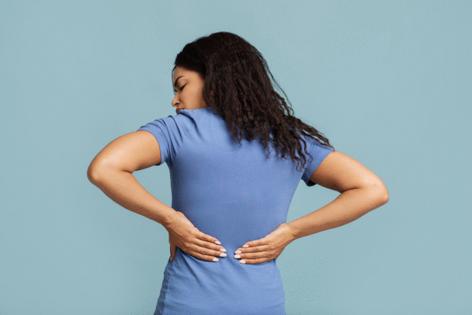Back pain basics and self-care tips
Published in Health & Fitness
When it comes to back pain, there's good news and bad news.
The good news is that back pain is rarely a sign of something serious and is often relatively short-lived. The bad news is that it's a common ailment for many adults. About 80% of adults experience pain in their back at some point in their lives.
Nearly 90% of back pain cases are temporary, and people make a full functional recovery within 12 weeks of the onset of their symptoms.
What causes back pain?
Some of the most common causes of back pain include:
-- Arthritis
Lower back pain often is caused by osteoarthritis, or wear-and-tear arthritis, the most common type. Just as arthritis affects your knees, hips, wrists and shoulders, it also affects your spine. The spine has over 30 segments, each with four joints and discs, that can develop arthritis.
The joints in your back can swell and become larger, similar to the symptoms of arthritis in the knuckles of the hand. This inflammation and enlargement can lead to a narrowing of the space around the spinal cord or nerve roots, a condition called spinal stenosis.
Also, cartilage degenerates as you age, so bone-on-bone joint movement can cause pain with movement.
-- Bulging or ruptured disks
Disks are the cushioning between the bones in your spine that absorb impact, similar to the suspension on your car or a mountain bike. Disks can bulge or rupture and press on a nerve. Also, they can degenerate with time and lose the ability to provide cushion for average day-to-day impact, which can result in back pain.
-- Muscle or ligament strain
Repeatedly lifting heavy objects or twisting your back quickly can strain muscles and spinal ligaments. Carrying extra weight can strain your back, leading to pain.
It's not always possible to pinpoint a reason for back pain. Back pain can sometimes be tracked to muscle strain from a fall or lifting something heavy. More commonly, people can't tie their pain to any specific activity or event.
When should you seek care for back pain?
Rarely, back pain may be a sign of something serious.
However, you should schedule an appointment with your health care team if you have pain that:
Accompanies unintended weight loss
Arises with swelling, redness on your back and fevers, which could indicate an infection
Causes weakness, numbness or tingling in one or both legs
Follows a fall, blow to your back or another injury
Happens during or after cancer treatment
Is constant or intense, especially at night or when you lie down
Occurs with new bowel or bladder control problems
Spreads down one or both legs, especially if the pain extends below your knee
How can you find relief from back pain?
Although you may want to head to the couch when you're hurting, continued light activity and stretching can help in recovery.
Doing regular activities and even light exercise is all right unless the activity worsens the pain. Recovering from an injury means a gradual increase in activity. Listen to your body and try to keep moving.
Avoid actions that further stress your back, such as bending over to tie your shoes, twisting your entire body, bending from your waist or performing high-impact exercises.
Rest, applying heat to the affected areas and over-the-counter pain medications, such as ibuprofen, naproxen or acetaminophen, might be enough to ease the pain. If your pain isn't better after several weeks, you may need to see your healthcare professional for an evaluation.
How can back pain be prevented?
The best way to avoid back pain is to prevent it by taking good care of your back.
Recommended activities include:
Exercise.Walking, swimming and other low-impact aerobic activities can strengthen your back.
Build muscle strength and flexibility.Stretching your back and strengthening your back and core muscles can support and protect your back. Plank holds and push-ups are good ways to help build your core.
Sit, stand and lift correctly.Avoid slouching and standing or sitting in one position for too long. When you need to lift something heavy, lift from your legs, not your back.
Maintain a healthy weight.Carrying extra pounds strains back muscles.
If you smoke, quit.Smoking reduces blood flow through the smaller blood vessels throughout your body and can reduce your body's ability to heal injuries.
©2024 Tribune Content Agency, LLC.










Comments